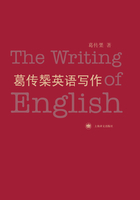
CHAPTER Ⅰ INTRODUCTION
1. Composition and Compositions.The title of this book, which is now The Writing of English, was originally A Textbook of English Composition. The last word is “Composition”, not “Compositions”. “Composition” is an uncountable noun, meaning the art or practice of writing. “Compositions” (plural) is a countable noun, meaning pieces of writing; the singular form “composition” (as in “a composition” and “this composition”) means a piece of writing.
“Piece(s) of writing”, however, is a vague term. A single sentence is a piece of writing; a book of many volumes is also a piece of writing. Both may therefore be called “compositions”. Between these two extremes there are various kinds of compositions, in whatever way they may be classified. But “compositions” has the narrower sense of school compositions or “student compositions”, that is, short essays written on given subjects as educational exercises, or what is known in American schools as “themes”.
2. Purpose of this Book.This book is not confined to compositions in the narrower sense though these are by no means neglected. Nor does it claim to teach the writing of novels, short stories, dramas, poems, literary criticism, newspaper editorials, or scholarly treatises. It gives principles, suggestions, models, and exercises that will help you to express yourself well in English no matter what form of writing you may happen to do.
This book is written for you, who are supposed to be a Chinese student of English having a vocabulary of several thousand words and a fair knowledge of grammar, but having had little practice in writing, and even less in speaking, the language. From the use of this book you may expect to acquire the art of expression in English — on condition that you do all the exercises carefully, preferably under the guidance of a competent teacher, and act upon all the principles and suggestions as far as possible.
3. Your Advantage.As I have said in the above, you “are supposed to be a Chinese student of English ... having had little practice in writing, and even less in speaking the language”. If you had been brought up in an English-speaking family, you would no doubt have more freedom of expression in the use of English than you have. But you have your advantage too. Just because you have not been brought up in an English-speaking family, you will be saved a great deal of trouble of trying to unlearn many errors and faults peculiar to those having been brought up on English. You are not, for instance, in the habit of using the notorious double negative, as in “I don't know nothing about him”, which many English-speaking children say when they ought to say “I know nothing about him” or “I don't know anything about him”.
Much of the material that is usually found in books of composition written for English-speaking students is therefore quite useless to you — perhaps as useless as any method of getting rid of the cigarette habit would be to non-smokers.
4. Your Special Difficulties.Being the kind of student you are, you have certain special difficulties in learning English composition. You are perhaps a better speller than the average English or American schoolboy is; you have perhaps had more practice in parsing and analysis than he has; you perhaps know a great many words that he does not know. But you find it much more difficult to express many common ideas and thoughts than he does; you are far less good at the use of many common words than he is; you may even make such ridiculous mistakes as he never dreams of.
A large part of this book is devoted to helping you to conquer these difficulties.
5. Rhetoric.The two words “and Rhetoric” might have been added to the title of this book. You would like to have them added, wouldn't you? At any rate, you must not think that the high-sounding word “rhetoric” as used in the titles of so many American books of English composition has anything “deep” in it. In fact, it is practically equivalent to “composition” or “the art or practice of writing”, as can be seen from the following definition of the term quoted from a very popular book of “Composition and Rhetoric”: “Rhetoric consists of the study of the principles governing the clear, forceful, and elegant expression of thoughts”. Such books, which are often called “rhetorics” (with the singular “a rhetoric”) in America, do not teach anything that is not taught in those having only the more homely word “composition” in their titles.
If I have dropped the word “rhetoric” from the title of this book, however, it is not merely because the term would sound more or less like an Americanism or because it would not have much meaning. There are two other reasons. First, this book is not a formal treatise on rhetoric in the old-fashioned sense of the word: it does not make a parade of the many jaw-breaking rhetorical terms that are of little use except as an essential part of a knowledge of rhetoric, such as “asyndeton”, “oxymoron”, and “syllepsis”. Secondly, this book abstains from advising the observance of many rules that exist only from a narrowly rhetorical point of view: it mentions some of them only to condemn them as superstitions, such as “A sentence should not begin with ‘and’” and “A sentence should not end with a preposition”.